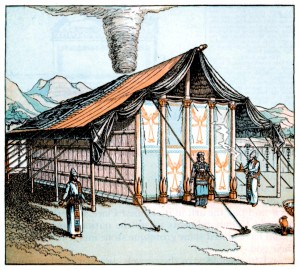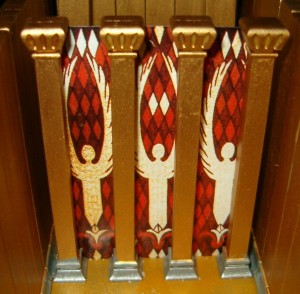Exodus 36:32, Five bars. To what might these prophetically point? Possibly two things. There are five books in the Torah, which contain the light of Elohim’s truth, and which point man to Yeshua the Messiah who is the Living Torah-Word of Elohim and the spiritual light of the world.

Furthermore, upon his ascension, Yeshua gave the fivefold ministry (apostle, prophet, evangelist, shepherd and teacher) to bring the saints into “the measure of the stature of the fullness” of himself (Eph 4:10–13). It is the duty of those who hold these ministry offices to reveal to the world the light of Yeshua the Messiah and to show people the way to him.
Even as these five bars helped to hold up the tabernacle sanctuary containing the furnishings that pointed the way to a more intimate spiritual relationship with Yeshua, the Torah is the vessel that contains the truth that points the way to the Messiah, and he has commissioned his ministers to be anointed vessels who contain the message of Yeshua and are to proclaim him as the Savior of the world.
Exodus 36:35, He made a veil. There were three doors to the tabernacle or mishkan. In the previous chapter, two are mentioned (Exod 36:35–37; see also Exod 26:31–37). The three doors are the veil or parochet between the set-apart place and the most set-apart place, the outer door to the tabernacle and the door or screen to the tabernacle courtyard.

Yeshua likened himself to a spiritual door that one must enter in order to saved and to experience an abundant life (John 10:7–10). As we have learned in our other studies on the Tabernacle of Moses, everything about it prophetically points to Yeshua the Messiah. The door to the set-apart place of the tabernacle was held up by four gold-covered acacia wood pillars. These represent the four Gospels, which proclaim the good news salvation through Messiah. Moreover, these four books of the Bible are the entry point through which most people come when first hearing the message of Yeshua.
Each of the three doors was blue, scarlet, purple and white. All three colors point to different aspects of Yeshua, his origin and mission (blue is for heaven, scarlet is for blood, white is for spiritual purity or righteousness, purple is for royalty or kingship). The four colors point to the four Gospels each of which highlights a different aspect of Yeshua’s life and ministry, and each of which are the doors through which one enters into a spiritual relationship with him.
Why was there a veil between the set-apart place and the most set-apart place? Who does this represent? (See Heb 10:19–20.) Why could no one except the high priest once a year enter through that veil into the most set-apart place without dying? (Rom 3:23; Rom 6:23; Ezek 18:4). How do we now have access to the Father through the veil? (Heb 10:19–22) Why was the veil in the temple rent at the time of Yeshua’s death on the cross (Matt 27:51)?








